Hallucinations - Who Is Likely To Suffer From Them?
Be it sound or smell, vision or touch or taste, our senses help us experience the world around us. The brain always responds when there is a stimulus. So, we see an object, hear a sound, feel something, etc. When there is no stimulus, but there is still a response, it is hallucinations. This sense of something which is not real is by definition hallucinations. This could be related to past experiences or our deep inner feelings and is much more common than we think.
Causes:
Most psychiatry disorders including schizophrenia, Parkinson’s disease, and other forms of dementia start off as hallucinations.
- Migraines usually are accompanied by visual aura.
- Brain tumors can cause different types of hallucinations depending on where it is located and the corresponding area it is affecting.
- Epilepsy also depends on the type of seizure, different hallucinations would be seen.
Types:
- Visual: Seeing things which are not there, for instance, flashes of light, insects crawling on self or another person, someone standing where no one is there, etc.
- Auditory: The affected individual could hear voices coming from inside himself or from outside. These voices could be giving instructions to the person, calling out to him/her, or be talking to each other.
- Olfactory: Again, these imaginary smells could be coming from within the person or from an external source.
- Tactile: The affected person could feel a rush of hot air being blown, feeling of insects crawling on the body, feeling of being tickled, etc.
- Gustatory (taste): When something is eaten, it could taste like something completely different, which is very odd. This could be related to some past experience in some people.
Hallucinations are initial symptoms of the onset of psychiatric disorders. In fact, most of these are insidious in onset, where it cannot be exactly identified when the disease began. Therefore, if a person has hallucinations for prolonged periods, and if they are progressing, it is best to get more testing done.
Other symptoms include:
- Confused thoughts
- Disorganized speech
- Incoherently speech
- Reduced social interactions
Who is likely to experience hallucinations?
- A person who gets very anxious, even about small things, a fear of losing touch with reality
- People with migraine headaches. These suffer visual hallucinations very commonly and may also have auditory hallucinations.
- Children who are having a fever. They might see or hear something which is not real.
- People on illegal drugs like amphetamines, LSD, and Ecstacy. In fact, this is what creates addiction.
- Sudden withdrawal from alcohol or drugs. It is always advisable to withdraw from illicit drugs under supervision as hallucinations are very common.
In case you have a concern or query you can always consult an expert & get answers to your questions!



+1.svg)
